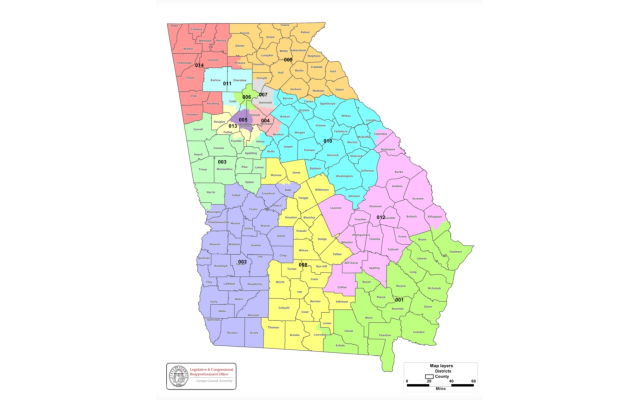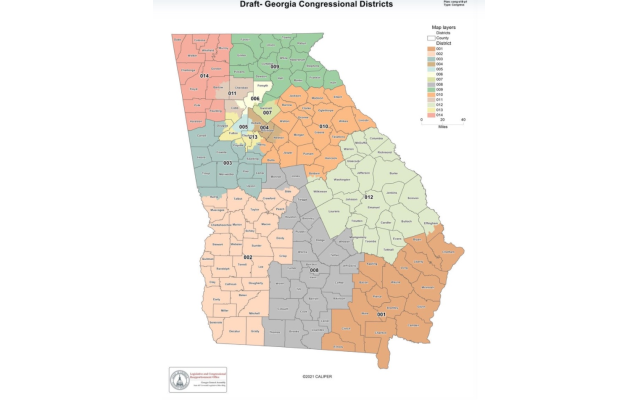Redistricting Alters Georgia Political Landscape
Redrawn district lines, especially for Congress, will keep the state in the national spotlight for the 2022 campaigns.
Dave Schechter is a veteran journalist whose career includes writing and producing reports from Israel and elsewhere in the Middle East.
Redistricting has thrown a fistful of spice into the 2022 election stew.
As they drew new maps for congressional and legislative districts, the Republicans who control the kitchen — by virtue of majorities in the state House and Senate — added a little here and subtracted a little there to keep the flavor to their liking. Democrats, by and large, were left looking through a window, with little input on the recipe.
The maps, redrawn every 10 years following the Census, have cleared the General Assembly and now await Republican Gov. Brian Kemp’s signature. Pending any court challenges, these maps will remain in effect for a decade. The General Assembly will deal with county commission and school board maps when it convenes in January.
Georgia’s population has increased by 1 million since 2010, to 10.7 million residents, due largely to minority growth in metro Atlanta. The maps reflect the population shift toward the Atlanta area, and away from middle and south Georgia. Congressional districts will average roughly 765,000 residents; state Senate districts 191,000, and state House districts 59,500.

Republicans found a way to improve on their 8-6 margin in Georgia’s congressional delegation. The 6th district — a Republican stronghold that Democrats flipped in 2018 and held in 2020 — will again be GOP-friendly, while mapmakers ceded to Democrats the 7th district seat they flipped in 2020. Georgia could impact control of the U.S. House, where Democrats currently hold just an eight-seat advantage.
The 6th was altered by replacing parts of DeKalb and Fulton counties with portions of more conservative Forsyth, Cherokee, and Dawson counties. DeKalb County now will be shared by the reliably Democratic 4th and 5th districts. In the 7th, sections of Forsyth County were removed, creating a district that covers more than half of increasingly Democratic Gwinnett County and most of Johns Creek.

Soon after the General Assembly approved the congressional map, 6th district incumbent Democrat Lucy McBath announced that she would run in the 7th district, already represented by Democrat Carolyn Bourdeaux.
Several Republicans already had filed for the chance to challenge McBath in the 6th and more may enter the race. The GOP primary winner will be favored to win the general election.
A Bourdeaux-McBath tilt in the 7th could highlight tensions between the Democrats’ moderate and progressive wings. Both issued statements on Nov. 22.

McBath said: “Brian Kemp, the Republican Party, and the NRA [National Rifle Association] will not have the final say on when my work in Congress on behalf of my son is done.” McBath’s 17-year-old son, Jordan Davis, was slain in Nov. 2012, as he sat in a car outside a Jacksonville, Fla., convenience store, by an assailant who objected to the volume of the music coming from the vehicle.
Bourdeaux said: “Georgia’s 7th district deserves a representative that understands their issues. I am the Gwinnett representative in the race for a predominantly Gwinnett district. The people of the 7th deserve a representative that understands and cares about their needs and has a record of fighting for them in Washington. It’s my hard-fought honor to serve the people of Gwinnett and GA’s 7th District and I look forward to continuing to do so.”
Bourdeaux lives in Gwinnett County, outside the redrawn 7th district, and McBath lives in Marietta, but there is no requirement that members of Congress live in the districts they represent.

“It should be noted that Cobb and Gwinnett, two growing and increasingly Democratic counties, were ‘cracked’ to minimize their electoral impact,” said Matt Weiss, legislative affairs chair and board member of the Jewish Community Relations Council of Atlanta. Sections of Cobb County will be represented in four congressional districts and Gwinnett County in three.
The northwest Georgia 14th district, more than three-quarters white and currently represented by Republican Marjorie Taylor Greene, will now include African American and Democratic parts of Cobb County, including Austell and Powder Springs.
The maps suggest that Republicans will maintain their majorities in the state House and Senate, though Democrats may make inroads. Republicans currently hold a 103-77 margin over Democrats in the state House and a 34-21 advantage in the state Senate.
“On the surface, the maps for the state House and the state Senate appear to benefit Democrats, by increasing their expected numbers by six or seven in the House and one in the Senate,” Weiss said. “However, a deeper look indicates that certain districts, particularly in the northern Atlanta suburbs, were ceded in order to shore up the remaining districts needed to ensure a Republican majority in both houses of the legislature throughout the decade.” Weiss, who also serves as deputy general counsel of the Democratic Party of Georgia, emphasized that he was not speaking on behalf of the JCRC or the party.

The maps reflect the shift toward Atlanta, said attorney Josh Belinfante, who served as chief legal advisor to Republican Gov. Sonny Perdue and as legal counsel to the state House Judiciary Committee. For example, Fulton County has several state House and Senate districts, while some rural counties south of Macon have only one of each. “This means that, when it comes to setting state policy, urban and suburban legislators will outnumber those from rural areas. That said, rural issues and rural development remain critical issues to legislators, and many of the leadership positions and critical committee chairs hail from rural areas,” Belinfante said.
Democratic state Rep. Mike Wilensky, the lone Jewish member of the General Assembly, saw his district’s borders change slightly and given a new designation. His current district 79 includes all of Dunwoody, a small piece of Chamblee, Doraville north of Interstate 285, and the former Chevrolet plant in Doraville on the south side of I-285.
Wilensky will run for re-election in what will be district 80, which will include all of Dunwoody except for two southwest precincts, more of Chamblee, and all of Doraville. “I am running for House district 80 and look forward to being the representative for Dunwoody, Doraville, and a little bit of Chamblee,” he told the AJT.
Those two Dunwoody precincts have been added to House district 52, which includes a large portion of Sandy Springs and Brookhaven, where Democrat Shea Roberts is running for re-election.

Weiss noted the creation of Democratic-leaning districts in areas with Jewish populations, including Senate district 14, covering northern Sandy Springs and Roswell, and House district 53, which stretches narrowly from Buckhead to downtown Roswell.
Even with the small number of Jews elected in recent years, “The General Assembly has routinely passed legislation supported by many in the Jewish community, including the authorization to purchase Israel Bonds, requirements that companies doing business with Georgia do not engaged in BDS [Boycott, Divestment, and Sanctions] activity, and working to make sure that state contracts do not go to persons doing business with Iran,” Belinfante said. “I am hopeful that redistricting will not erode support for these efforts, and candidly, I have no reason to believe that the new maps will dilute support for these kinds of bills.”
Georgia’s maps no longer require Justice Department approval. In 2013, the U.S. Supreme Court struck down the portion of the Voting Rights Act that required pre-clearance in states with a history of discrimination against minorities. The Supreme Court further ruled in June 2019 that federal courts cannot intervene in claims of deliberately partisan redistricting, sometimes referred to as “gerrymandering.”
- Dave Schechter
- News
- Local
- Josh Belinfante
- draft map
- GEORGIA
- 14 congressional districts
- Lt. Gov. Geoff Duncan
- Georgia Legislative and Congressional Reapportionment Office
- State Republicans
- Georgia General Assembly
- Lucy McBath
- 6th Congressional District
- Carolyn Bourdeaux
- 7th Congressional District
- Matt Weiss
- Cobb County
- Gwinnett County
- Mike Wilensky
- re-election
- congressional district
- legislative district
- Senate
- Democrats
- Census
- Governor Brian P. Kemp
- U.S. House
- county commission map
- school board map
- DeKalb County
- Fulton County
- John's Creek
- Forsyth County
- Cherokee County
- Dawson County
- NRA
- Gov. Sonny Perdue
- Jordan Davis
- marietta
- Jewish Community Relations Council of Atlanta
- Marjorie Taylor Greene
- Austell
- Powder Springs
- Democratic Party of Georgia
- State House Judiciary Committee
- Macon
- dunwoody
- Chamblee
- Doraville
- Sandy Springs
- Brookhaven
- Shea Roberts
- Roswell
- Israel Bonds
- Iran
- Justice Department
- U.S. Supreme Court
- Voting Rights Act




comments